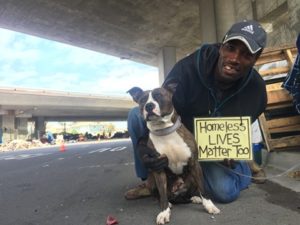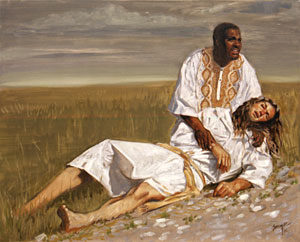We Deceive Ourselves
A sermon preached at the Church of the Incarnation, San Francisco, by Christopher L. Webber on the Second Sunday of Easter, April 8, 2018.
If we say that we have no sins, we deceive ourselves. I John 1:8
If you forgive the sins of any, they are forgiven them; if you retain the sins of any, they are retained. St. John 20:23
There’s a familiar story about Calvin Coolidge, President almost a hundred years ago, who was a man of few words. When he came back from church one day They asked him about the sermon. What was it about. “Sin,” said the President. “Well, what did the preacher say about it?” They asked. “He was against it,” said Mr. Coolidge.
Me, too. But let me say a bit more. Let me talk about sin. The epistle reading said: “ If we say that we have no sin, we deceive ourselves.” In the Gospel, Jesus said, “If you forgive the sins of any, they are forgiven them; if you retain the sins of any, they are retained.” So we need to talk about sin. Sin is a big part of life. You probably have some experience with it. Most of us do. But the gospel is about not only sin but also forgiveness. I think too many Christians miss the point.
I think at one extreme there are Christians who ignore sin entirely and at the other extreme there are Christians who spend too much time on it but don’t really understand it.
On the one hand, there’s a kind of Christianity out there that hardly ever  mentions sin. Do you remember how when they asked the current President about his faith he said he had never asked for forgiveness? Some churches today don’t mention sin. And I guess that’s where the President had been, and you can see the results. Some churches don’t mention sin. They don’t want to upset people. They talk about being positive and happy and emphasize feeling good. Well, fine, but that’s not Christianity. Christianity is about the love of God, yes. It’s about love and forgiveness, but it recognizes the many ways we reject that love and shut God out of our lives. There’s a lot of Christianity that skips over all that and gives you comfortable chairs and entertaining music and says, “Feel good.” Fine, but Christian faith is about facing sin and being restored to life, forgiven, renewed, nourished, fed. It’s about being changed and changing the world. And it starts with forgiveness for sin.
mentions sin. Do you remember how when they asked the current President about his faith he said he had never asked for forgiveness? Some churches today don’t mention sin. And I guess that’s where the President had been, and you can see the results. Some churches don’t mention sin. They don’t want to upset people. They talk about being positive and happy and emphasize feeling good. Well, fine, but that’s not Christianity. Christianity is about the love of God, yes. It’s about love and forgiveness, but it recognizes the many ways we reject that love and shut God out of our lives. There’s a lot of Christianity that skips over all that and gives you comfortable chairs and entertaining music and says, “Feel good.” Fine, but Christian faith is about facing sin and being restored to life, forgiven, renewed, nourished, fed. It’s about being changed and changing the world. And it starts with forgiveness for sin.
The other extreme form of Christianity puts sin at the center as if it were all that mattered. It is important. Don’t get me wrong. But some preachers make it sound as if sin is all we need to care about. I think all the traditional evangelical churches have been guilty of an overemphasis on sin, pounding it in over and over and never moving on to the joy of forgiveness and the peace that comes afterwards. And the worst part of it is that it often gets identified with sex. The Roman Church also has done that. It’s one of the reasons why their priests can’t marry and women can’t be ordained. Sin and sex get wrapped up together in a funny way and that misses the point too. It makes for a narrow kind of Christianity that’s good at condemning but not very good at encouraging: not very good at forgiving, renewing, strengthening, not very good at giving thanks for God’s goodness.
Sin is not just about sex or swearing or stealing or lying – that’s the easy part. The churches that center on sin tend to center on personal failures and, of  course, there’s plenty to talk about. But I think that the worst sins are the ones that have a social dimension: war and unemployment, a correction system that fails to correct an educational system that fails to educate a health care system that leaves too many people outside. I can go down the list of the Ten Commandments and check off making a graven image and committing adultery and murder and feel pretty good about myself but where do wars come from and why aren’t our schools better and why are there so many unemployed? Is no one responsible? Does it all just happen to happen and nothing can be done about it? Does anyone think it’s God’s will? I would think it was pretty obvious that war and unemployment and so on result from human decisions, but often a set of human decisions so interlinked that it’s hard to say who did it. Who got us into Iraq and Afghanistan? Who got us into Vietnam? It would be nice to have someone to blame but the truth is that no one person did it. No, lots of people did it. We all did it. We voted for the people that did it. And if we didn’t do it ourselves, we failed to use our influence. We all failed collectively to be wise enough or caring enough to make better choices and the result is that people suffer.
course, there’s plenty to talk about. But I think that the worst sins are the ones that have a social dimension: war and unemployment, a correction system that fails to correct an educational system that fails to educate a health care system that leaves too many people outside. I can go down the list of the Ten Commandments and check off making a graven image and committing adultery and murder and feel pretty good about myself but where do wars come from and why aren’t our schools better and why are there so many unemployed? Is no one responsible? Does it all just happen to happen and nothing can be done about it? Does anyone think it’s God’s will? I would think it was pretty obvious that war and unemployment and so on result from human decisions, but often a set of human decisions so interlinked that it’s hard to say who did it. Who got us into Iraq and Afghanistan? Who got us into Vietnam? It would be nice to have someone to blame but the truth is that no one person did it. No, lots of people did it. We all did it. We voted for the people that did it. And if we didn’t do it ourselves, we failed to use our influence. We all failed collectively to be wise enough or caring enough to make better choices and the result is that people suffer.
Sin has a social dimension. Jesus fed the hungry and healed the sick because how can you know God’s love when you’re sick and hungry and can’t find a decent place to live? How can we come here and talk about God’s love and not be concerned for those who are hungry and homeless and unemployed? But who’s responsible? Why is it my fault? Well, there might have been a time when individuals could say “It’s not my fault.” But not in a democracy, not when we choose the people who pass the laws that make a difference for those in need or allow such evils to go unchecked and grow. I think it’s the churches that talk most about sin that are often the churches that talk least about corporate sin. The churches that carry on about abortion are missing the point, taking the easy out. It’s much too easy to condemn someone else. We can feel very righteous about condemning others. But the sins that beset our society are broader and deeper and affect millions more than will ever want an abortion. They begin with us and all the people who never let their faith inconvenience them.
When was the last time I had to make any hard decisions because of my faith? When was the last time you did? When was the last time you tried to think through the connection between all the problems of our society and our faith? “If we say that we have no sin,” St John tells us, “we deceive ourselves.” Too many churches do that. Too many just ignore sin and tell us God wants us to be happy. Well, yes, God does; but we can’t be happy – God can’t be happy – when so many of our neighbors are not happy. We are asked to love our neighbors as ourselves and we have too many neighbors who aren’t  experiencing love, who lie bleeding at the side of the road waiting for a Good Samaritan who never comes. There’s too little being done to create a social system that doesn’t just feed the hungry but enables more people to find work that enables them to feed themselves.
experiencing love, who lie bleeding at the side of the road waiting for a Good Samaritan who never comes. There’s too little being done to create a social system that doesn’t just feed the hungry but enables more people to find work that enables them to feed themselves.
“We deceive ourselves,” St John tells us, “if we say that we have no sin.” We deceive ourselves, if we fail to see the real and deep problems we face and just go along when decisions are made that draw us away from God. But the Gospel tells us God’s will is forgiveness. God’s will is to love us God’s will is to call us together to love God and love our neighbor and carry the new life we are given out to a world that needs to know God loves us, and God forgives us. If we know that, if we understand that, If we face the truth about ourselves, and know the truth about God’s love and forgiveness, then, with God’s help, maybe we can begin to come together and begin to make a difference.
 Christopher L. Webber
Christopher L. Webber